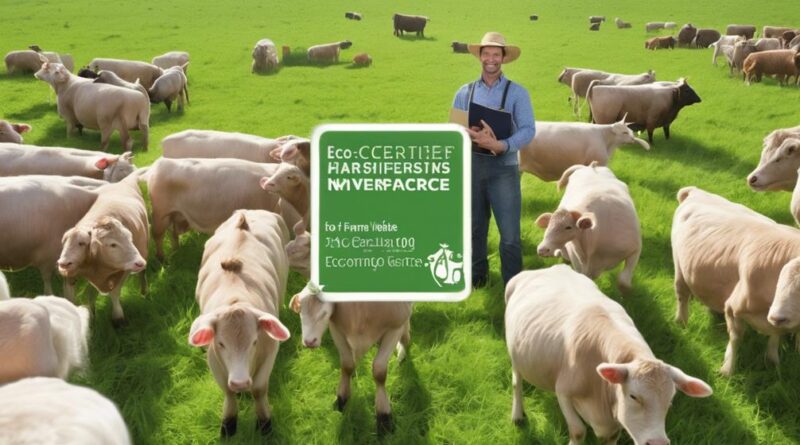Mastering the Certification Process for Eco-friendly Livestock
Have you ever felt like navigating the certification process for eco-friendly livestock is akin to solving a complex puzzle?
The journey towards achieving organic certification for your livestock can be filled with challenges and requirements that may seem overwhelming at first.
However, by understanding the intricacies of the certification process and diligently following the necessary steps, you can pave the way towards ensuring your livestock meets the highest eco-friendly standards.
Mastering the certification process is not just about obtaining a label; it's about committing to sustainable practices that benefit both your livestock and the environment.
Understanding Organic Livestock Certification
To grasp the concept of organic livestock certification, begin by understanding the principles behind sustainable farming practices. Organic farming practices focus on maintaining soil health, biodiversity, and ecological balance while avoiding the use of synthetic pesticides and fertilizers. Sustainability is at the core of organic farming, ensuring that resources are conserved for future generations.
Consumer demand plays a significant role in driving the market value of organic livestock products. As more consumers become aware of the environmental and health benefits of organic products, the demand for organic livestock products continues to rise. This increased demand leads to higher market value for certified organic products, creating economic incentives for farmers to adopt organic farming practices.
Eligibility Criteria for Certification
Understanding the principles of sustainable farming practices is key to meeting the eligibility criteria for eco-friendly livestock certification. To start the process, an eligibility assessment is conducted to determine if your livestock management practices align with the certification requirements. This assessment typically includes an evaluation of factors such as the use of organic feed, the implementation of animal welfare standards, and the management of pastureland to promote biodiversity and soil health.
Certification requirements often focus on the reduction of environmental impact, the promotion of animal well-being, and the adherence to specific standards set forth by certifying bodies. It's essential to ensure that your livestock operation meets these criteria to qualify for certification. This may involve making adjustments to your current practices to align more closely with sustainable and eco-friendly guidelines.
When preparing for the certification process, it's crucial to review the specific eligibility criteria provided by the certification body. Pay close attention to the details outlined in the requirements to address any potential gaps in your current practices. By familiarizing yourself with the certification requirements and actively working towards meeting them, you can increase your chances of successfully obtaining eco-friendly livestock certification.
Documentation and Record-keeping
Maintaining thorough documentation and accurate record-keeping is essential for successfully navigating the certification process for eco-friendly livestock. When it comes to record maintenance, it's crucial to keep detailed records of various aspects such as feed sources, medication administration, pasture management, and waste disposal methods. These records serve as evidence of compliance with eco-friendly standards and help demonstrate your commitment to sustainable practices.
Effective data tracking is another key component of documentation for eco-friendly livestock certification. You should establish a system to track important data points like animal health records, environmental impact assessments, and any changes made to your farming practices to reduce ecological footprint. This data not only aids in the certification process but also allows you to monitor the effectiveness of your sustainability efforts over time.
Farm Inspection Procedures
When preparing for farm inspection procedures for eco-friendly livestock certification, ensure that your facilities and practices align with sustainable standards. The audit requirements for eco-friendly livestock certification typically involve an on-site inspection of your farm to verify compliance with environmentally friendly practices. During the inspection, a certified auditor will assess various aspects of your farm operations to ensure they meet the necessary criteria.
It is essential to familiarize yourself with the inspection checklist provided by the certification body to understand what'll be evaluated during the farm inspection. The inspection checklist will outline specific requirements related to sustainable farming practices, animal welfare, waste management, and environmental conservation measures. By reviewing the checklist in advance, you can address any potential areas of non-compliance and make necessary adjustments to ensure a successful inspection.
During the farm inspection, the auditor will observe your livestock management practices, feed storage methods, waste disposal processes, and overall farm infrastructure. They'll also examine your record-keeping systems to ensure accurate documentation of inputs and practices. By demonstrating your commitment to eco-friendly livestock production and adhering to the audit requirements, you can increase your chances of achieving certification. Remember to stay organized, transparent, and proactive throughout the inspection process to showcase your dedication to sustainable agriculture.
Compliance With Organic Standards
To ensure your farm meets the requirements for eco-friendly livestock certification, it's crucial to align with sustainable practices, including compliance with organic standards. Sustainable farming practices play a vital role in achieving organic labeling for your livestock products. Organic labeling indicates that your products have been produced in accordance with strict guidelines that prioritize environmentally friendly and animal welfare practices.
In sustainable farming, the focus is on maintaining the health of the soil, water, and air, which directly impacts the well-being of the livestock. By following organic standards, you commit to using natural fertilizers, promoting biodiversity, and avoiding synthetic pesticides and antibiotics. These practices not only benefit the environment but also ensure that your livestock is raised in a healthy and ethical manner.
When your farm complies with organic standards, you not only contribute to a healthier ecosystem but also meet the growing consumer demand for sustainable and organic products. Consumers are increasingly seeking out organic labeled products due to their perceived health benefits and reduced environmental impact. By incorporating sustainable farming practices and obtaining organic labeling, you position your farm as a responsible steward of the environment while meeting the market's preference for eco-friendly livestock products.
Transitioning to Organic Practices
Transitioning to organic practices involves gradually implementing sustainable farming methods to align with eco-friendly livestock certification requirements. Embracing sustainable farming is essential for not only meeting organic standards but also for promoting environmental stewardship. Here are some key steps to help you transition smoothly:
- Evaluate Current Practices: Begin by assessing your current farming methods and identifying areas that need improvement to meet organic standards. Look for opportunities to reduce chemical inputs and enhance biodiversity on your farm.
- Implement Crop Rotation: Rotate crops to maintain soil health, prevent disease, and reduce the reliance on synthetic fertilizers. This practice also helps improve soil structure and fertility over time.
- Integrate Livestock: Introducing livestock into your farming system can help enhance soil fertility through natural manure inputs. Utilize rotational grazing techniques to promote healthier pastures and minimize environmental impact.
- Invest in Training: Educate yourself and your staff on organic farming practices and the principles of environmental stewardship. Stay informed about the latest research and best practices in sustainable agriculture to continually improve your operations.
Applying for Certification

To obtain certification for eco-friendly livestock practices, you must adhere to specific requirements that demonstrate your commitment to sustainability and environmental responsibility. The certification process overview includes submitting an application detailing your farming practices, including feed sources, waste management, and use of chemicals. Meeting these application requirements is crucial for approval.
Obtaining certification offers various benefits. Firstly, it validates your eco-friendly livestock practices, enhancing your reputation among consumers seeking sustainable products. With the increasing market demand for environmentally responsible goods, certification can open up new opportunities and access to niche markets that prioritize eco-consciousness. Moreover, certification can lead to higher profitability as consumers are often willing to pay a premium for certified eco-friendly products.
When applying for certification, ensure that your farming practices align with the standards set by the certification body. Detail your commitment to sustainable practices, such as rotational grazing, organic feed, and reduced chemical usage. By meeting these requirements and obtaining certification, you not only contribute to a more sustainable future but also position yourself to thrive in a market that values environmental responsibility.
Maintaining Organic Certification
How can you ensure continued compliance with organic certification standards?
Maintaining your organic certification involves diligent effort and attention to detail. Here are some essential steps to help you stay on track:
- Stay Updated on Certification Renewal Deadlines: Make sure to keep track of when your organic certification needs to be renewed. Missing the deadline could result in a lapse of certification and potential loss of organic status.
- Prepare for Compliance Checks: Be ready for regular compliance checks by keeping detailed records of your livestock practices, feed sources, and veterinary treatments. Having organized documentation will make these checks smoother.
- Utilize Organic Labeling: Properly label your eco-friendly livestock products as organic. Clear and accurate labeling not only helps you stay compliant but also educates consumers about the benefits of choosing organic products.
- Prioritize Consumer Education: Take the time to educate consumers about the importance of organic farming practices and the positive impact it has on the environment. By raising awareness, you can build a loyal customer base that values your commitment to sustainability.
Frequently Asked Questions
Can Livestock Be Considered Eco-Friendly if They Are Raised on Conventional Feed but in a Sustainable Environment?
Livestock can still be considered eco-friendly if raised on conventional feed but in a sustainable environment. Sustainable practices like efficient resource management and waste reduction can offset the environmental impact of conventional feed.
Ensuring that the animals are raised in a manner that minimizes harm to the ecosystem and promotes overall sustainability is key.
Are There Specific Requirements for the Disposal of Waste and Manure on an Eco-Friendly Livestock Farm?
To manage waste effectively on an eco-friendly livestock farm, proper waste management practices are crucial. This includes ensuring responsible disposal of manure and waste materials.
Implementing composting systems, recycling organic matter, and utilizing manure for fertilizing crops are common practices. By following these guidelines, you can maintain a sustainable environment and promote eco-friendly practices on your farm.
How Do Climate Change and Other Environmental Factors Impact the Certification Process for Eco-Friendly Livestock?
When it comes to climate change and other environmental factors, they can greatly impact the certification process for eco-friendly livestock. These influences play a crucial role in ensuring sustainability and climate adaptation practices are being implemented on the farm.
Understanding how these factors affect the environment is key to meeting the requirements for certification. By addressing these challenges head-on, you can demonstrate your commitment to eco-friendly practices in livestock production.
Are There Any Special Considerations for Raising Livestock in Urban or Non-Traditional Farming Environments When Seeking Eco-Friendly Certification?
When raising livestock in urban or non-traditional farming settings and aiming for eco-friendly certification, you'll face unique urban challenges. To address these, explore sustainable practices tailored for urban agriculture.
Innovative solutions like vertical farming, rooftop gardens, and aquaponics can help maximize space and resources while minimizing environmental impact. By adapting to the urban landscape, you can meet certification requirements and contribute to a more eco-friendly livestock production system.
What Are the Potential Consequences for Non-Compliance With Eco-Friendly Livestock Certification Standards?
If you don't comply with eco-friendly livestock certification standards, you might face legal ramifications and financial penalties. Non-compliance can also harm the environment and erode consumer trust.
It's crucial to adhere to the standards to avoid these consequences and maintain your reputation as an environmentally responsible livestock producer. Be diligent in meeting the certification requirements to protect both your business and the ecosystem.
Conclusion
Congratulations on mastering the certification process for eco-friendly livestock! By understanding the criteria, keeping meticulous records, undergoing farm inspections, and staying compliant with organic standards, you have taken a significant step towards sustainable farming practices.
Transitioning to organic practices and applying for certification may have been challenging, but your dedication will pay off in the long run.
Remember to continue maintaining your organic certification to ensure the health and well-being of your livestock and the environment. Well done!
